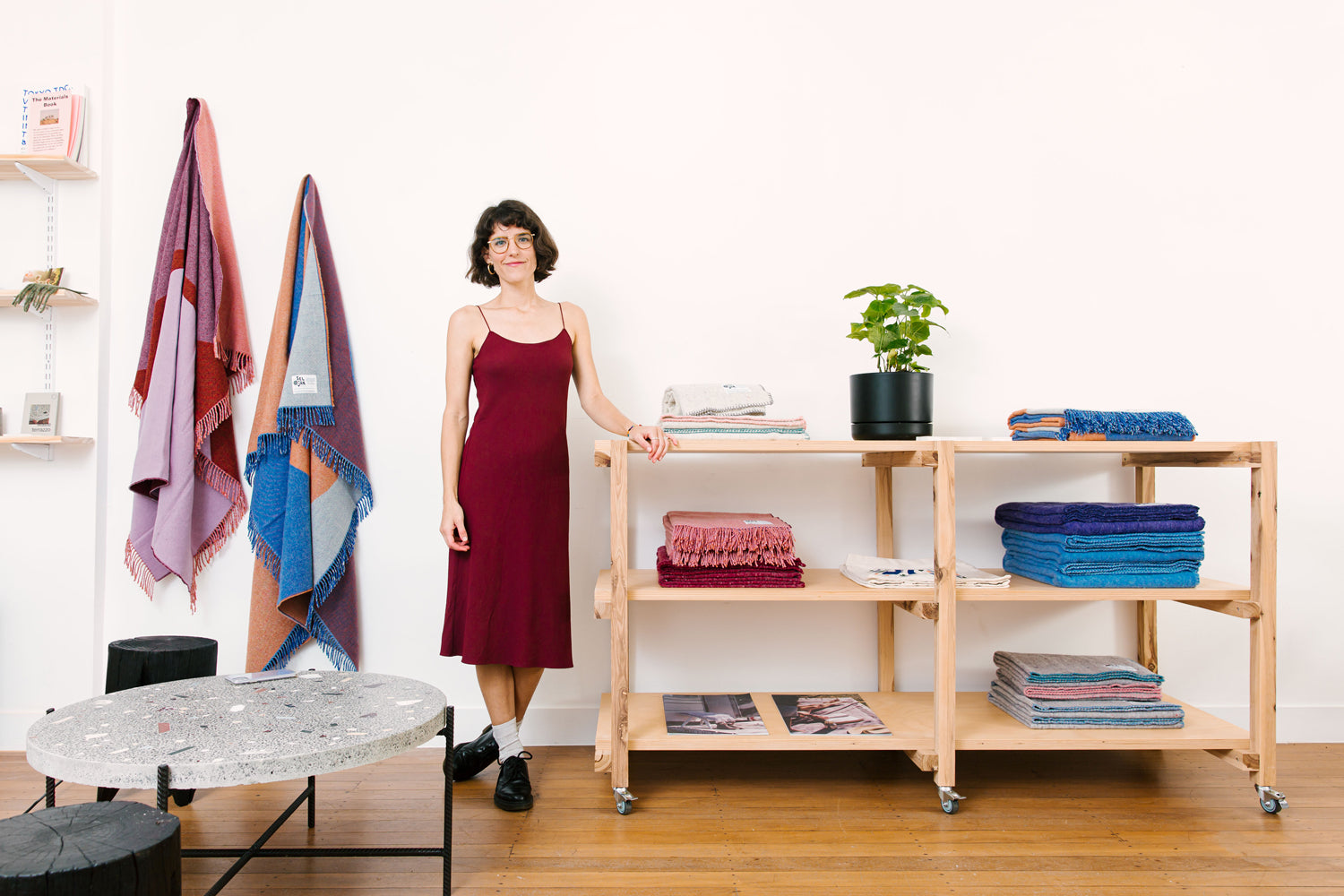
Sisters Karina and Samantha Seljak were inspired by the circular economy and closed loop manufacturing practices they saw gaining traction in Australia. They combined their talents, Karina has a background in fashion design and Sam in social enterprises, and embarked on a journey into the circular economy that would lead them to the oldest textile mill in Australia.
They worked with the mill, who were already retaining their offcuts, to make recycled wool blankets. Imbedded in the products they design is a closed loop system that re-manufactures the blankets at the end of their life.
Today, they work with mills in both Australia and overseas in Lithuania and Italy to make the recycled wool blankets that have a dedicated design following. They use their story as a starting point to promote a broader conversation about the circular economy and closed loop models.
We caught up with Sam Seljak of Seljak Brand to talk about their blankets and the brand’s new base in Brisbane, which they fit out together with Five Mile Radius. The result is a space that is sustainably built, flexible and showcases their shared passion for design and circularity.

 ‘Karina and I were interested in working with local resources and we knew there had to be better ways to make a new things. So when we came across the circular economy we became really excited because we could see a positive future for designing and making things sustainably.
‘Karina and I were interested in working with local resources and we knew there had to be better ways to make a new things. So when we came across the circular economy we became really excited because we could see a positive future for designing and making things sustainably.
We came across the oldest mill in Australia. They were collecting their waste and had the capacity to spin it into yarn. So we commissioned them to make blankets. But we also worked with them to ensure we had an end of life solution for the product.’
‘Remanufacturing is the last thing you want to do with a resource in the circular economy. First and foremost, you want to create something that has longevity, that's worth caring for and worth repairing. The mills we work with makes blankets that have been known to outlive their owners. The quality and longevity is incredible. So we haven't had a lot of returns and we don't expect to for some years still.’


‘The studio space we’re now in was sitting empty for seven or eight months last year. I was living with Clare, who founded Five Mile Radius, and our businesses both work in the waste resource space and the design realm. So it was a pretty natural fit when I thought about who might be interested in taking the space with us. We got the keys in early December last year. And then we basically spent the summer holidays fitting it out.
The space was an art gallery beforehand so there wasn’t much we needed to do to it structurally. Clare, a registered architect, led the design. And then Clare and I did a lot of the work on the tools that don't require a license and Clare’s partner, Jack Hamilton, who’s a carpenter and furniture maker did the rest. The primary driver for us when we were conceiving the space was connecting it back to the principles of the circular economy.’
‘All the furniture in the space has been designed for disassembly. The fixtures don't have any glue at all, it’s all screw fixed that can be taken apart at the end. For everything else we tried to source it secondhand and use waste or recycled materials where possible, and if not, then we made sure materials were sourced ethically.’

‘Clare from Five Mile Radius developed the waste terrazzo to use the construction waste from job sites around Brisbane. It's made from 100% recycled concrete.’
‘We chose to use plywood for its flexibility and because the pine is sustainably forested. We also designed the desks so they work with the supplied dimensions of the plywood, so we didn't have a whole heap of cut-offs.’
‘We have a few of the Five Mile Telegraph Stools which are made out of decommissioned timber power poles. We’ve also included a few other great Australian designers that we love, like the recycled plastic pots from Mr Kitly.’

‘Seljak Brand exists to create beautiful products that are regenerative by design and illustrate a more sustainable way to make and use things. We were acutely aware of the immense waste in the textiles industry and its impact on the environment. A blanket is a product that people only need to purchase once. Ideally, a blanket should transcend seasons and trends. We were inspired by companies like Dr Martens or RM Williams who’ve been making the same shoes, in the same styles, for decades. The other thing about blankets is that they’re more evocative than, say acoustic paneling, which is another textile waste product. People tend to cherish something that's really close to their skin and they’re more motivated to care for it and make it last.’
•
Our range of Seljak Brand’s recycled wool blankets will be restocked later this month.
Visit our Inspired By Seljak HQ collection of Australian made furniture here.
Photographs by Anwyn Howarth
Interview and introduction by Amy Snoekstra






